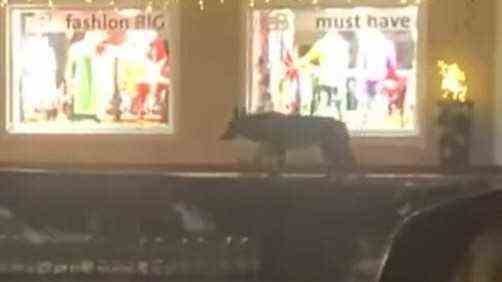It was Wednesday evening, just after 9 p.m. Christian Gutsjahr wanted to smoke a cigarette. So the 26-year-old young farmer went to the balcony of his parents’ farm in Bergen (Traunstein district). Then he noticed that there was great unrest among the goats in the stable next door. “Of course I wanted to see what was going on,” reports Gutsjahr. “I took a flashlight and went to the stable.”
In the darkness a goat spotted a goat on the ground about 30 meters away and a large gray animal above it. “I immediately thought that this is the wolf that is out and about in our area,” says Gutsjahr. “I turned on the flashlight and shined it at the two animals. Then the wolf ran away.” The goat survived the attack. Nevertheless, the incident will fuel the dispute over the return of the wolves to Bavaria again.
Bergen is a rural community with many farms in the southeast of the Chiemsee. The Gutsjahr family runs a detached homestead, which is a bit out of the way near a wooded area. Father Josef, mother Elfriede and son Christian keep 300 sheep, goats and highland cattle spread over five stables and extensive pastures. Bergen, which lies at the foot of the 1,674 meter high Hochfelln, is also popular with day trippers and holidaymakers.
And hikers and mountaineers come out of Munich, a hundred kilometers away, in summer and winter. After all, the town of 5000 inhabitants can be easily reached via the A8 motorway. The locals have been haunted by wolves for weeks. Because the attack on the Gutsjahr family’s goat is not the only incident in the area.
The wolf walks past a fashion shop decorated for Christmas
The wolf was also spotted in an industrial park on Wednesday evening, reports Christian Gutsjahr. A little later he ran through the middle of the town. A film sequence that is widely distributed on the Internet testifies to the latter. The clip is six seconds short and was taken from a car. He shows the wolf walking past a fashion shop decorated for Christmas. People cannot be seen. Once the wolf turns briefly to the right, as if he wanted to look into the window. “The wolf apparently ran from the industrial park through the center of the village to our farm,” says Christian Gutsjahr. “The fashion shop is on the main street right by the church.” In addition, one could understand the path of the predator in large parts based on the tracks that it has left snow.
It is these pictures that let the predator experts at the State Office for the Environment (LfU) be fairly certain that it is a wolf and not a poaching shepherd dog that is out and about in mountains. The authority in Augsburg is responsible for the wolf management in Bavaria. The experts have now not only examined the film sequence. But also the attacked goat, the stable and the pastures of the Gutsjahr family. “It will take a while until we have genetic evidence of whether it was actually a wolf,” says an LfU spokesman. “But we think it’s very likely.” The experts also expect the genetic test to clarify the question of whether the wolf is the same one that killed five sheep on the pasture of another Bergen farmer at the beginning of November.
For the Traunstein district administrator, CSU politician Siegfried Walch, the renewed wolf attack is confirmation that he is right in calling for the predator to be shot down as quickly as possible. Walch has always shared the conviction of many farmers that resettling Bavaria by wolves and grazing cattle, sheep and other livestock are mutually exclusive. According to his credo, wolf attacks on farm animals would increase so much that sooner or later grazing animals would come to an end. From Walch’s point of view, predators must at least be kept away from Upper Bavaria.
They can only be shot in exceptional cases
That is why the district administrator made a formal application to the government of Upper Bavaria at the beginning of November to have the wolf shot in his region. On Friday he confirmed the demand. The wolf is “a security risk, so something urgently needs to be done,” said Walch. “Anything else would be completely irresponsible and that’s why we will fight for it.”
For Walch it is of secondary importance that wolves are among the most strictly protected animals. According to European, German and Bavarian nature conservation law, they can only be shot in exceptional cases. First and foremost, this includes the protection of life and limb. The Bavarian “Wolf Action Plan” from 2019 also provides high hurdles for removing a wolf, as the shooting is called in bureaucratic German. Meanwhile, the Gutsjahr farming family is worried about their animals. “Spring and with it the next grazing season are here quickly,” says father Josef. “How are we supposed to protect our sheep and goats when the wolf is still in the region.”

